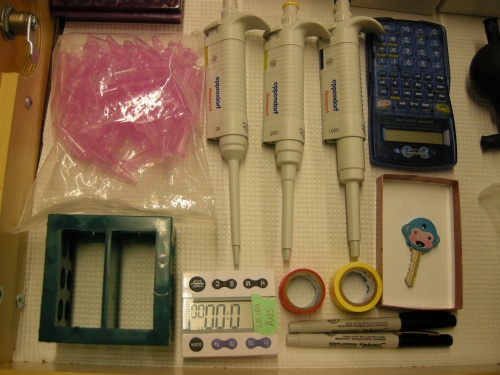20.109(S11):General lab policy
From Course Wiki
Lab Attendance
Lab attendance is mandatory and there are no make-up labs. A family crisis or severe illness requiring attention from the infirmary and prohibiting you from all your coursework are acceptable reasons for missing lab and every effort will be made to accommodate you in these exceptional circumstances.
Things to do
- Be on time. At the start of the lab period, there will be a short introduction to the experiment you will perform that day. It is unfair to your partner and to others in the lab if you are not up to speed when the work begins.
- Inform the instructor and/or TA if there is a problem. You will have their immediate attention if you have cut yourself (even if you consider it minor), if something broke and needs cleaning up, or if you are on fire.
- Be aware of all the safety devices. Even though the instructor and TA will take care of emergencies, you should know where to find the first aid kit, the chemical spill kit, the eye wash and the safety shower.
- Keep clutter to a minimum. There are empty cabinets to store your backpacks and jackets. Anything left in the aisles is likely to be stepped on and is a hazard to everyone.
- Be aware of others in the lab. Areas of the room may be crowded at times and you should take care not to bump into your labmates (who may be holding something precious) or to disturb their benchtop experiments.
- Wash your hands before you leave the lab for the day.
- Bring your lab notebook and an open mind to every lab meeting.
Things not to do
- Do not eat, drink, chew gum, smoke or apply cosmetics in the lab. Just being in lab makes your hands dirtier than you can imagine and you don���t want to accidentally eat any reagent (see item 6 on ���things to do��� list).
- Do not work with chemicals until you are sure of their safe handling. This includes some awareness of their flammability, reactivity, toxicity, and disposal.
- Do not touch "non-lab" equipment (including phones, computers, and doorknobs) with gloves on. When removing gloves is inconvenient, use the foot pedals at the sinks or wrap a paper towel around the sink handle.
- Similarly, note that most lab equipment is "gloves on," and you may expose your hands to residues left by a previous user if you leave them bare.
- Do not put pieces of lab equipment in your mouth. It sounds obvious but you���d be surprised!
